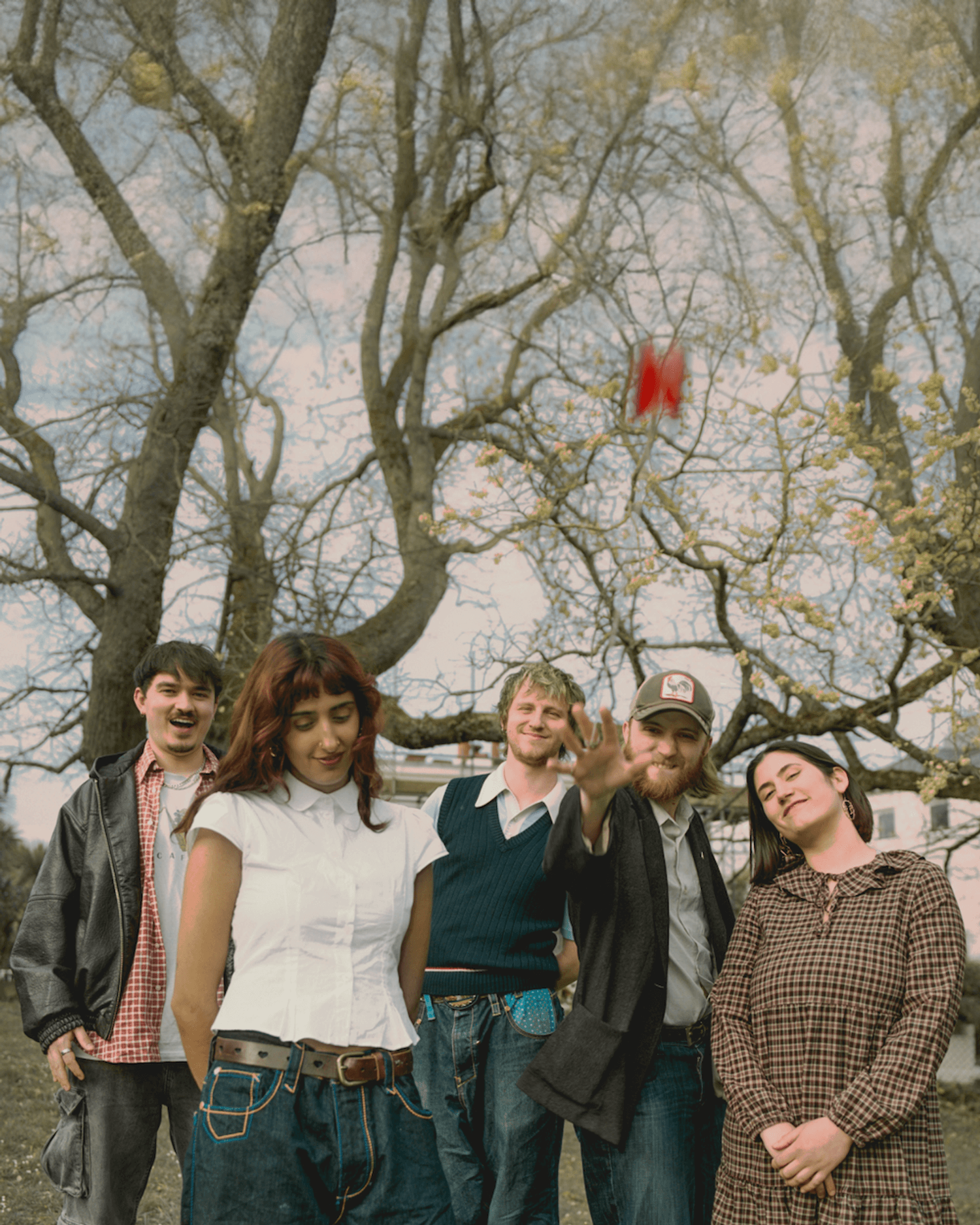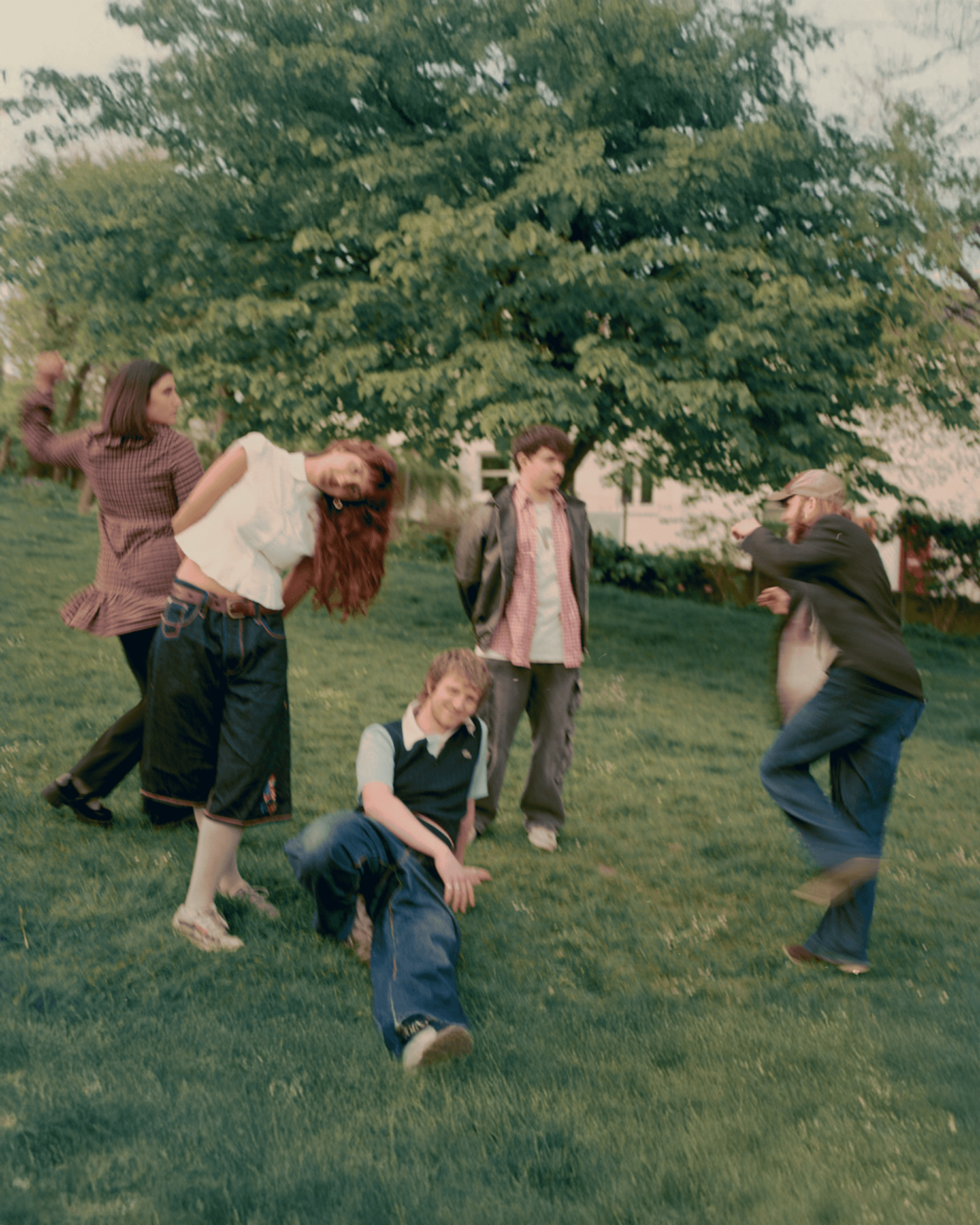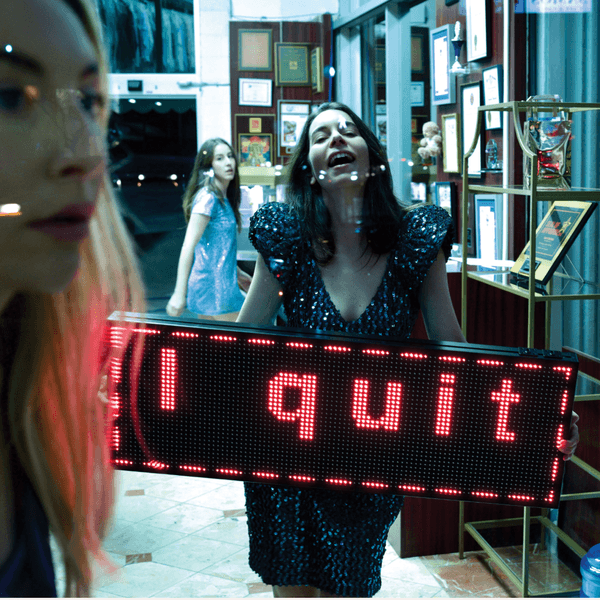
AtticOmatic don't colour inside the lines
Ahead of their set with Man/Woman/Chainsaw for SON Estrella Galicia this week, Brighton’s genre-agnostic collective AtticOmatic tell Max Gayler how they're turning neurodivergence, chaos, and vulnerability into startlingly intimate music.
AtticOmatic’s music is something unfolding in real time. The Brighton five-piece, fronted by dual vocalists Kamran Kaur and Lorcan Forder, don’t write songs so much as they translate emotional frequency.
Their debut EP, Fold the World, is loose, lush, and radically exposed – a snapshot of five exceptionally talented young people writing without a map and learning to hear themselves, and each other, more clearly.
“There’s nothing perfect about it,” Kaur says simply. That ethos – that music should be lived-in, unpolished, and unfiltered – runs through every inch of Fold the World. What makes these songs land is not technical finesse or sonic uniformity, but the disjointedness, the slippage, the sense that each track is still growing, even as it ends. “It just feels very of a certain time for us,” adds Forder. “We wouldn't have any music out if it had to be the perfect version of a thing.”
AtticOmattic’s sound has got that conservatoire feel without all the BRIT school alumni. Somewhere between English Teacher, The Voidz, and SPRINTS, their cinematic world bleeds originality. Having formed in a house-share in Brighton, they’ve been playing music together for longer than their discography lets on. “We’ve actually been making music together for six or seven years now,” says Forder as he looks over at his partner.
Rounded out by bassist Marie Freiss, drummer Kai Raghunath, and guitarist Ollie White, each member brings a distinct musical vocabulary, making the band less a frontperson vehicle and more a five-way dialogue. Everyone’s fingerprints are on everything.

Together, Kaur and Forder form the writing core of AtticOmatic, and it’s through their shared experience of late-diagnosed neurodivergence – Kau received an autism diagnosis in 2023 and Forder received his ADHD diagnosis the same year – that the band’s deeper emotional logic begins to emerge. “It informs everything we do,” says Kaur. “It’s not like a theme. It’s literally just the way we see the world.” Rather than abstracting or aestheticising their neurodivergence, AtticOmatic immediately realised it was already intrinsic to their creative process – fractured thoughts, unpredictable song structures, overlapping voices, hooks that don’t resolve where you expect them to. They don’t iron those things out. They write them in.
Kaur speaks about discovering her neurodivergence like someone unearthing a thread that's run invisibly through her life and lyrics. “I remember listening back through to the songs I'd written over the years after I got the diagnosis and thinking like, ‘holy shit, all of these songs are about the autistic experience.’ But I didn’t know at the time.” The moment wasn’t just revelatory, it was deeply emotional. “It was sad, almost. I was really desperately trying to express these things that I didn’t know what they were, and I didn’t even know if anyone else felt the same way.”
What Kaur found was that she had been writing in code. Lyrics that once felt abstract suddenly became precise once the language of autism gave her a lens to understand them. “I didn’t have the vocabulary at the time,” she explains. “Now I’ve got specific words for every single one of my traits, but back then, I was just trying to poetically explain them.”
Forder’s experience has been more intuitive, more kinetic. Like his brain writes faster than it explains. “I think my lyric writing is quite abstract and disjointed,” he says, “but that’s just how my ADHD brain works. It’s jumping around all over the place.” His approach to songwriting resists linearity. “I love songs that tell a story, but I just couldn’t stay in that one thought for the whole song.” That’s part of why they decided to plaster Fold the World’s cover with origami creations from Forder’s step-dad. “I admire anyone who can focus on one thing for that long,” he smiles.
The pair are keen to distinguish that their songs aren’t about diagnosis. It’s more that they’re informed by it. “We’re not writing ballads about autism or ADHD,” says Forder. “It’s not even that we’re talking about it. It’s just how we feel, how we see the world, and how people interact with us.” For Kaur, that context allows them to embrace what might otherwise have been labelled “wrong.”
That sense of recognition isn’t limited to the band. They’ve found listeners responding with startling openness. “People have definitely come up to us more and talked about neurodivergence,” says Forder. “Not even asking questions, just relating it to their own lives, or their own music.” For some fans, hearing the songs was an affirmation that they weren’t alone. For others, it helped reframe things they’d never quite understood in themselves. “It’s a nice thing to share,” Kaur says. “Especially because we could pass [as neurotypical], you know? To someone who doesn’t know us well, they might not see all the things we’re carrying.”
That ambivalence, to be visible and invisible at once, shapes the rawness in AtticOmatic’s music. Their sound is never didactic, never polished to the point of smoothness. It’s layered with false starts, abrupt turns, unspoken meaning. Kaur puts it simply: “You can’t not be part of it. Neurodivergence informs everything. It’s not something we separate from the music. It is the music.”
Writing songs with a romantic partner demands an unusual kind of intimacy. More than honesty, it needs translation. For Kaur and Forder, who have been in a relationship for years, the line between love and lyric is porous. “Even being in a relationship is hard,” Kaur admits. “Telling your partner all of your deepest feelings is one thing. But then sharing lyrics with a partner – that’s something else.” What began as a vulnerable exchange has, over time, evolved into a deepening of both their emotional and creative fluency.
“It definitely felt like that at the beginning,” says Forder, recalling the early days of songwriting together. “Like you’re breaking off a piece of you and giving it to someone.” But the process is no longer as delicate. “The way we write our songs, they’ve almost Venn diagrammed. There’s more and more crossover, and we influence each other in all these different ways.”

Still, there’s tension – the good kind. “We’re comfortable enough now to be super savage with each other,” Kaur laughs. “I can kind of say to you, no, I don’t like that bit. Redo that bit.” Forder, for his part, nods. “Yeah, you used to get more upset about it. Now you’re like, okay, I’ll give it a go.”
The result of this is a pulverising and uncompromised sound. A sound which has been touted by music media for its explosive live transformation. Their erratic, obtuse, yet calming brand of alt-rock sounds like something you’d hear from a group with much more pedigree than AtticOmatic. Kaur’s incredible voice is full of deep character, perfectly paired with Forder’s dynamic delivery that sits on top of the soundscape of a band talented beyond their years.
Determined to continue writing, they’re keeping their live shows to a minimum for the rest of the year. That means their show this Thursday (26 June) at the Sebright Arms supporting Man/Woman/Chainsaw and hosted by SON Estrella Galicia will be one of your last chances to see them this year.
Their process is elastic, intuitive. Forder often brings fragments – loose lines, hooks pulled from his notes – and starts rapping them out during practice. Kaur, who prefers to write alone, tends to contextualise his abstract lyrics later. “I’ll be like, what did you mean by this part?” she says. “So I can sort of relate it somehow. And it’ll be something I never would’ve thought of. That makes it really free for me to work off of. I can interpret it in my own way.”
That freedom has shaped AtticOmatic’s lyrical duality with one voice drifting into another – two perspectives on the same emotional terrain. They don’t always write from the same place, or even the same emotional reality, but the finished songs are a kind of convergence.
The band’s writing process thrives on contradiction. “We’ve got completely different music tastes,” Kaur explains. “There’s almost no point in having a reference, because we’re not going to understand each other’s references.” If Forder brings a song idea grounded in one genre, Kaur might filter it through something emotionally distant. The result is music that sounds stitched from friction – one part flowing ambient soul, another jagged indie-rock or experimental pop. “We don’t write a song to fit a way of doing it,” says Forder. “We write to see where it can go.”

That friction also helps protect their originality in a culture quick to label. “I don’t mind when people say stuff about genres,” Kaur concedes. “Because it’s usually the genre they like the most. But I don’t think we ever want to be pigeonholed.” Being genre-fluid means living in contradiction. Too jazzy for indie lineups, too raw for jazz crowds. “We got put on these really technical jazz bills,” Forder remembers. “And the audiences felt embarrassed for us, because we weren’t technical enough.” So they moved. Not simply to appease, but to evolve.
Fold the World feels less like a debut and more like a first real breath. It feels like something lived-in, a little scruffy around the edges, and all the better for it. What they’ve tapped into is something hard to fake: a kind of creative looseness that lets their songs stay elastic, surprising, and weirdly profound. “We’re already onto the next thing,” Kaur mentioned casually, and you get the sense they’re not looking back.
AtticOmatic play with Man/Woman/Chainsaw at a sold-out show for SON Estrella Galicia at Sebright Arms on 26 June.
Get the Best Fit take on the week in music direct to your inbox every Friday

Tropical F*ck Storm
Fairyland Codex

Loyle Carner
hopefully !

YUNGBLUD
Idols





